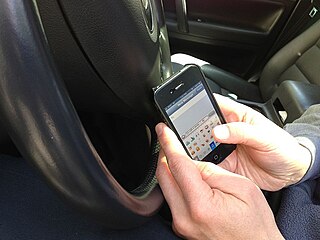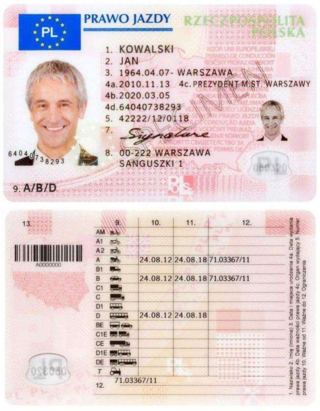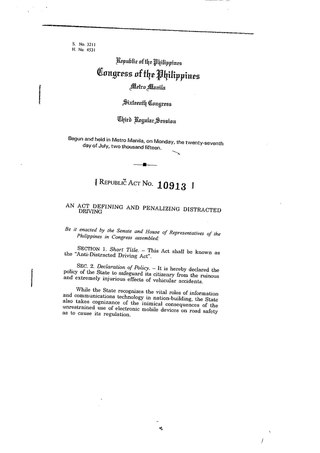
Driving under the influence (DUI) is the offense of driving, operating, or being in control of a vehicle while impaired by alcohol or drugs, to a level that renders the driver incapable of operating a motor vehicle safely. Multiple other terms are used for the offense in various jurisdictions.

Mothers Against Drunk Driving (MADD) is a non-profit organization in the United States, Canada and Brazil that seeks to stop drunk driving, support those affected by drunk driving, prevent underage drinking, and strive for stricter impaired driving policy, whether that impairment is caused by alcohol or any other drug. The Irving, Texas-based organization was founded on September 5, 1980, in California by Candace Lightner after her 13-year-old daughter, Cari, was killed by a drunk driver. There is at least one MADD office in every state of the United States and at least one in each province of Canada. These offices offer victim services and many resources involving alcohol safety. MADD has claimed that drunk driving has been reduced by half since its founding.

Driving Rain is the twelfth studio album by English musician Paul McCartney, released on 12 November 2001 as a double LP, a single cassette, and single CD.

The Driving Standards Agency (DSA) was an executive agency of the UK Department for Transport (DfT).
Graduated driver licensing systems (GDLS) are designed to provide new drivers of motor vehicles with driving experience and skills gradually over time in low-risk environments. There are typically three steps or stages through which new drivers pass. They begin by acquiring a learner's permit, progress to a restricted, probationary or provisional license, followed by receipt of a full driver's license. Graduated drivers' licensing generally restricts nighttime, expressway, and unsupervised driving during initial stages, but lifts these restrictions with time and further testing of the individual, eventually concluding with the individual attaining a full driver's license.

Driver's education, driver education, driving education, driver's training, driver's ed, driving tuition or driving lessons is a formal class or program that prepares a new driver to obtain a learner's permit or driver's license. The formal class program may also prepare existing license holders for an overseas license conversion or medical assessment driving test or refresher course. It may take place in a classroom, in a vehicle, online, or a combination of the above. Topics of instruction include traffic code or laws and vehicle operation. Typically, instruction will warn of dangerous conditions in driving such as road conditions, driver impairments, and hazardous weather. Instructional videos may also be shown, demonstrating proper driving strategies and the consequences for not observing the rules.

"Butterfly" is Japanese pop musician Kumi Koda's sixteenth domestic single. The single came in CD and CD+DVD, with the latter editions containing a foldout poster. Because her previous single "Hot Stuff feat. KM-MARKIT" was re-cut to become the final single for secret, "Butterfly" became the first single for Best ~first things~.

A bus driver, bus operator, or bus captain is a person who drives buses for a living.

Carleton E. "Carl" Beane was a sports radio broadcaster from 1972 until 2012, and was best known as the public address announcer for the Boston Red Sox of Major League Baseball. From 2003 until 2012, Beane was behind the microphone of every home game at Fenway Park, including Games 1 and 2 of the 2004 and 2007 World Series, opening each game with the words "Ladies and gentlemen, boys and girls, welcome to Fenway Park".

George Francis Hotz, alias geohot, is an American security hacker, entrepreneur, and software engineer. He is known for developing iOS jailbreaks, reverse engineering the PlayStation 3, and for the subsequent lawsuit brought against him by Sony. Since September 2015, he has been working on his vehicle automation machine learning company comma.ai. Since November 2022, Hotz has been working on tinygrad, a deep learning framework.

In Finland, the car driver's license can be obtained either in a private driving school or given by a relative with a driving instruction permit.

Texting while driving, also called texting and driving, is the act of composing, sending, or reading text messages on a mobile phone while operating a motor vehicle. Texting while driving is considered extremely dangerous by many people, including authorities, and in some places has either been outlawed or restricted. As a form of distracted driving, texting while driving significantly increases the chances that a driver will be involved in a motor vehicle accident.
Ray William Johnson is an American internet celebrity best known for his eponymous YouTube channel and his web series on that channel, Equals Three. In 2013, the channel surpassed 10 million subscribers and had over 2 billion views, making it one of the most watched and subscribed to channels at the time. Johnson left the series in March 2014 but continued to produce it and other web series like Booze Lightyear, Comedians On, and Top 6, the first two of which were later cancelled.

Various laws in the United States regulate the use of mobile phones and other electronics by motorists. Different states take different approaches. Some laws affect only novice drivers or commercial drivers, while some laws affect all drivers. Some laws target handheld devices only, while other laws affect both handheld and handsfree devices.

A driver's license or driving permit is a legal authorization, or the official document confirming such an authorization, for a specific individual to operate one or more types of motorized vehicles—such as motorcycles, cars, trucks, or buses—on a public road. Such licenses are often plastic and the size of a credit card.

The Anti-Distracted Driving Act (ADDA), officially designated as Republic Act No. 10913, is a Philippine law that prohibits distracted driving by restricting and penalizing the use of mobile phones and other electronics devices while driving on any public thoroughfare, highway, or street in the Philippines. The republic act defines "distracted driving" as "using mobile communications device to write, send, or read a text-based communication or to make or receive calls" or "using an electronic entertainment or computing device to play games, watch movies, surf the internet, compose messages, read e-books, perform calculations, and other similar acts" while behind the wheel of a moving vehicle or while temporarily stopped at a red light. The law covers all private and public vehicles, including agricultural machines, construction equipment, public utility buses and jeepneys, taxicabs, motorcycles, tricycles, pedicabs, kuligligs and carriages.












